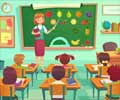
"It doesn't influence the top universities. It's the low-end universities that are affected. Their quality is low. The teaching is not so serious and the students are not so hard-working."
Declining birth rates and an explosion in the number of universities -- there are more than 160 for a population of 23 million -- mean the vast majority of high school students gain entry to higher education.
Taiwan had a total of 1.35 million university students at the end of June 2012, according to Ministry of Education figures.
But the boom has serious downsides for Taiwan -- with a polarised system resulting in many people receiving a sub-standard education that does not meet the overall needs of the economy.
The standard university entrance exam -- once a dreaded rite of passage -- has become little more than a formality. In 2011, the latest year for which figures are available, 90.4 percent of applicants gained admission.
Advertisement
Now the pressure is off and operators of the island's cramming schools preparing teenagers for the entrance exam report a relaxed atmosphere in their classrooms.
Advertisement
"Some high school students take it really easy. If you just want to make it to university, any university, you'll be fine no matter what," said Abby Yao, a 24-year-old psychology student at Fu Jen Catholic University.
"It's totally different from our parents' generation. Back then it was, like, one in four who could get into university."
Kuo Wen-chung, a senior manager with the Yu Da Education Institution, a popular cramming school, agrees that youngsters now take it easier.
"Definitely the students are less competitive than earlier generations, even though their parents have lavished more money on them," he said.
There are still people who study as hard as ever. They are the ones striving to make it into the top universities, which educate roughly one third of the student body.
But the other two-thirds risk ending up on the wrong side of an increasingly polarised education system, with the good, mostly state-run, universities on one hand and the not-so-good. mostly private, ones on the other.
Many people enter university even though it might not be in their own long-term interests, according to Kenneth Lin, an economist at National Chung Cheng University.
"The private universities just take the ones with low exam scores, because if they don't have enough students, they'll go bankrupt," said Lin.
"But the students face poor job opportunities when they leave, and in fact they would be better off going to a vocational school and then getting a job in manufacturing."
According to legislator Hsu, from the small opposition party Taiwan Solidarity Union, a university system divided into two distinct tiers is the opposite of what Taiwan needs right now.
Taiwan should give more people a vocational education, as it did in the early post-war years, he said.
"Although they had no degree, they had a special expertise, whether it was as a mechanic or an architect," he said.
"That was the basis for Taiwan's economic miracle from the 1960s to the 1990s. It provided a sufficient labour force for our industry."
Now the educational system does not necessarily produce the people the economy needs, and as a result Taiwan is in the paradoxical situation that it struggles with unemployment at the same time as industry cannot find workers.
Taiwan's jobless rate hit 4.31 percent at the end of July. The non-agricultural sector had an unmet demand of 202,000 workers in February, according to the most recent figures.
The island needs to take a U-turn, Hsu argued. Part of the reason for the plethora of universities is that many are upgraded vocational colleges, and he believes the process needs to be reversed.
But turning them back into institutions that produce highly skilled workers will not be easy in a society obsessed with education.
"The parents are the major difficulty. We have to persuade them not to hope that everyone of their children can become a lawyer or a doctor," Hsu said.
"In fact, carpenters and butchers with special skills may end up having better lives. And anyway, not everyone in a society can become president. Only one."
Source-AFP












